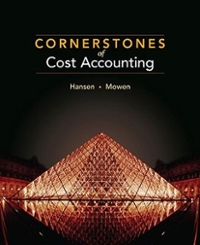Question
MAS BASIC CONSIDERATIONS AND MANAGEMENT CONSULTANCY Part 1 1.) Which is important competence or independence? Why? 2.) Differentiate management advisory services and management consultants. 3.)
MAS BASIC CONSIDERATIONS AND MANAGEMENT CONSULTANCY
Part 1
1.) Which is important competence or independence? Why?
2.)Differentiate management advisory services and management consultants.
3.) Enumerate the different opportunities in management services practice and explain each.
4.) Discu ss the professional ethics required in the management services engagement.
Part 2 MULTIPLE CHOICE
1.What is the primary purpose of Management Advisory Services?
a.to help clients identify their problems
b.to help clients maximize their resources
c.to reach and service more potential clients by the CPA firm
d.to improve the client's use of its capabilities and resources to achieve business objective
2.Which of the following is NOT a characteristic of Management Advisory Services (MAS)?
a.MAS is broad in scope
b.Beneficiary of service in management
c.MAS is repetitive as far as the same client is concerned
d.MAS involves problem-solving affecting future operations of the client
3.Which of the following is NOT a qualification of a CPA in MAS practice?
a.Auditor of the client
b.Analytical experience in problem solving
c.Professional independence, objectivity and integrity
d.Familiarity with the client's financial accounting and internal control systems
4.Which of the following statement is true?
a.Strict adherence to generally accepted accounting principles in MAS is required
b.In a management services engagement, the independent CPA renders technical advice
c.A non-CPA is prohibited under the revised accountancy law to engage in professional management advisory services to practice
d.A CPA in management services engagement may take position that would impart its independence if the client is not his audit client currently.
5.Which of the following is NOT an area in MAS practice?
a.Conducting special studies
b.Marketing and public relations work
c.Introducing new ideas, concepts and methods
d.Reviewing and suggesting improvement of policies, procedures, systems and methods.
6.Management and Services of CPAs cover all the following, EXCEPT
a.Project feasibility studyc.System design and implementation
b.Audit, tax and legal servicesd. Organizational development and planning
7.The MAS engagement that involves providing assistance to management in relation to planning, controlling and decision making.
a.Financial management c.Taxation
b.Management accountingd.Financial Accounting
8.This engagement involves the review of compliance with regulatory requirement and ethical conduct standards.
a.Strategic risk management c. Operational and systems risk management
b.Financial risk management d.Compliance risk management
9. These involves services related to mergers, acquisitions, divestitures, joint ventures, spin-off and strategic alliance.
a.Strategic risk managementc.Compliance risk management
b.Due diligence auditd.Financial risk management
10.Management consultancy ___________________.
a.Is limited to CPAsc.Can be practiced by anybody
b.Is not limited to CPAsd.is exclusive to the CPA profession
11.Most definitions of `consultancy' would include services related to the following,
EXCEPT
a.Information technologyc.Legal advisory
b.Corporate strategyd.Systems and operations management
12.Which of the following is NOT common reason for hiring a management consultant?
a.To render an independent opinion
b.To provide specialized skills and experience
c.To serve as a catalyst for needed changes in the workplace
d.To implement solutions and decide on business matters on behalf of the client
13.It is an offer of service which, if accepted and approved by the client, becomes a contractual agreement.
a.Contract c.Engagement letter
b.Confirmation letterd.Proposal letter
14.The engagement letter generally includes the following, EXCEPT
a.Objectives and benefits
b.Fees and billing arrangement
c.Scope of the work and the role of the consultant
d.Personnel who will be assigned to the engagement team
15.The MOST important factor in selecting an engagement team is to assign consultants
a.With prior experience in the client's industry
b.With a combination of skills and experiences in various business functional areas as well as in different industries
c.With the appropriate skills, experiences and types of thinking to deal effectively with the client's problem
d.Who are likely to employ different approaches to problem solving, such as highly imaginative thinking, or unusual skill in the interpretation and use of financial and statistical data
16.Factors that must be considered when defining the target level of competence of management consultants include the following, EXCEPT
a.Scope of practice area c.Service variety
b.Client requirementd.Investment required
17.The following are considered in determining that scope of services that a CPA may perform, EXCEPT
a.Independencec.Requirement for specialization
b.Competenced.Range of fees that the CPA will earn
18.As a business consultant, the CPA practitioner should
a.Encourage dependence of client on the consultant's staff so as to pinpoint clear responsibility in implementing systems
b.Exercise administrative control over the client's staff to avoid unnecessary delays in implementation.
c.Not take responsibility for making decisions and policy judgments in MAS engagements
d.Conduct his engagement as if he is a member of the client's organization
19.Which of the following statements is NOT acceptable?
a.A CPA provides consulting services to an existing audit client
b.A CPA offers and provides consulting services to two major competing clients
c.A CPA shares with a new client substantial information regarding another client belonging to same industry
d.A CPA represents three major players in rationalizing the industry's incentives before the government public hearings
20.A management advisory services engagement generally involves the following activities in what particular order? (NOTE: this question was given/asked in the 1996 CPA Licensure Examinations)
I.Post engagement follow-up
II.Implementing the recommendation
III.Conducting the engagement
IV.Negotiating the engagement
V.Preparing for and starting the engagement
VI.Evaluating the engagement
VII.Preparing and presenting the report and recommendation
a. VII,VI,V,IV,III,II and I
b.III,IV,V,VI,VII,I and II
c.IV,III,V,VI,II,VII and I
d.IV,V,III,VII,II,VI and I
Step by Step Solution
There are 3 Steps involved in it
Step: 1

Get Instant Access to Expert-Tailored Solutions
See step-by-step solutions with expert insights and AI powered tools for academic success
Step: 2

Step: 3

Ace Your Homework with AI
Get the answers you need in no time with our AI-driven, step-by-step assistance
Get Started


